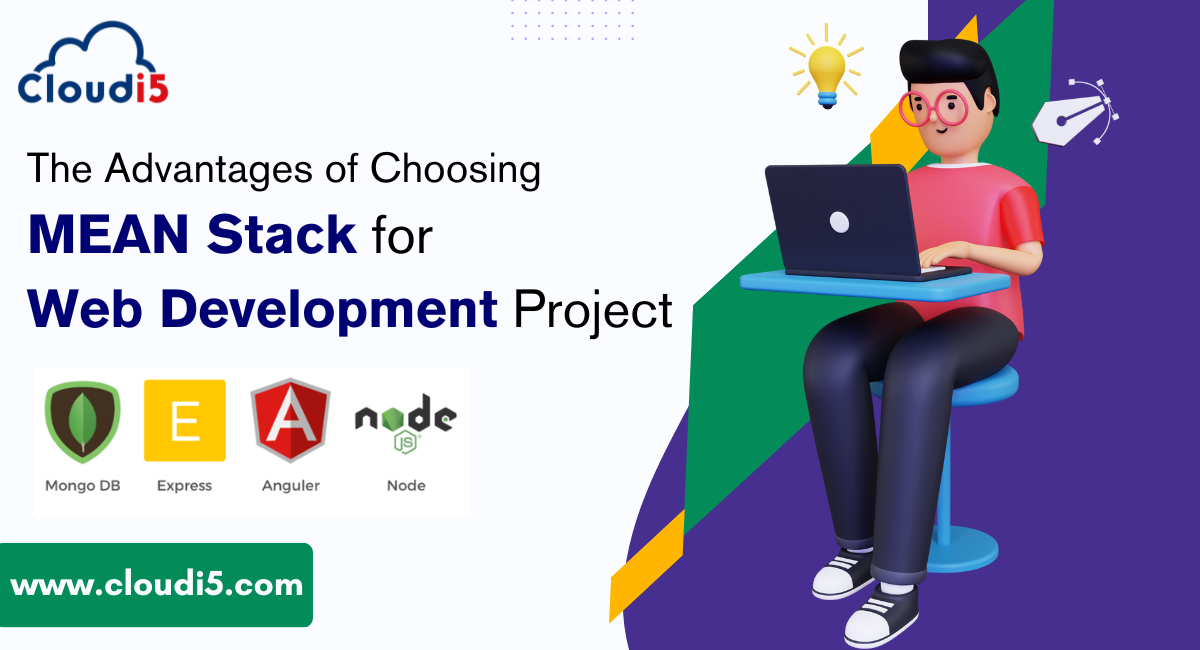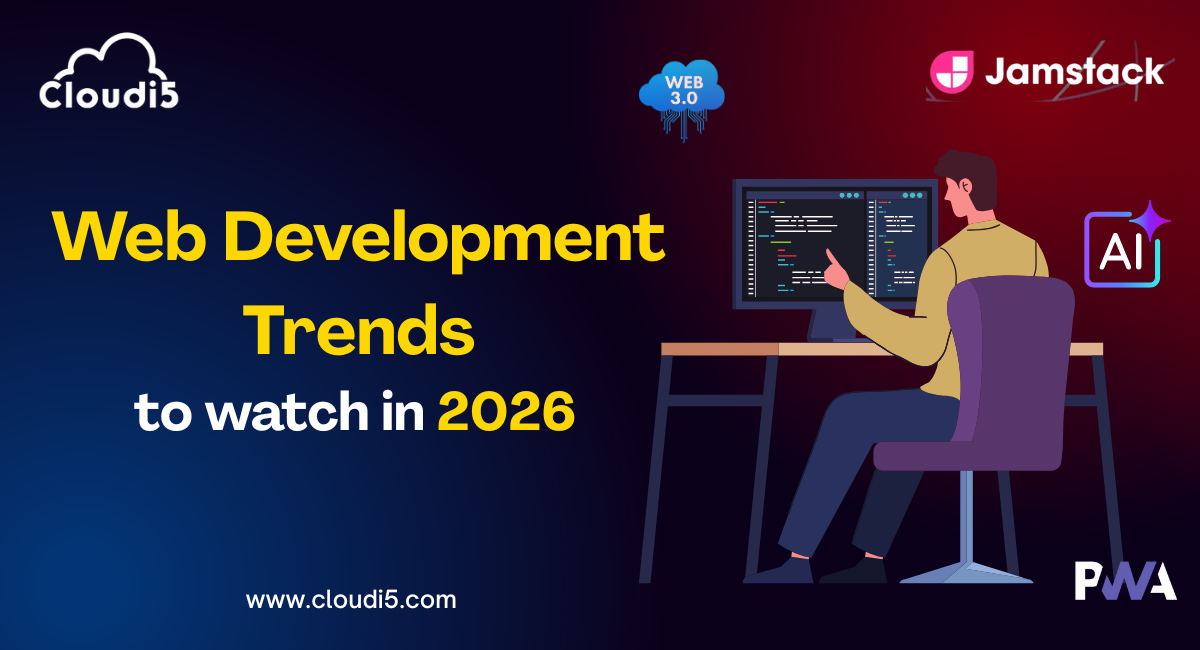
The Advantages Of Choosing MEAN Stack For Web Development Project
Are you prepared to transform your online businesses and realize the full potential of your initiatives? Introducing MEAN stack, a remarkable mash up of modern technologies that has swept the web development community by storm. In this blog post, we'll explore MEAN stack and provide tips on how to choose a web development company for your projects. Let's get going!
What is MEAN Stack Web Development?
MEAN stack development is a subset of full-stack web development that focuses on building online applications with JavaScript-based tools like MongoDB, Express.js, AngularJS, and Node.js. JavaScript allows developers to work with a single language throughout the entire development process.
Components of the MEAN Stack:
The MEAN stack comprises four main components:
1. MongoDB: The NoSQL database used in MEAN stack projects offers scalability, flexibility, and seamless integration with JavaScript.
2. Express.js: A minimalist web application framework that allows developers to build server-side applications quickly and efficiently.
3. AngularJS: A powerful front-end framework that enables dynamic and responsive user interfaces, making MEAN stack projects highly interactive.
4. Node.js: A server-side JavaScript runtime environment that handles the back-end and powers the entire MEAN stack. It allows for fast, scalable, and event-driven applications.
Advantages of MEAN Stack Development:
A web development company may choose MEAN stack for their projects due to the following compelling reasons:
- Single Language Throughout the Stack: The MEAN stack is entirely based on JavaScript, allowing developers to use the same language for front-end and back-end development. This unified approach streamlines the development process, reduces context switching, and enables the team to work cohesively.
- Rapid Development: MEAN stack development offers pre-built tools, libraries, and modules, accelerating the development process. AngularJS facilitates the creation of dynamic user interfaces, while Node.js's non-blocking I/O model ensures swift request handling, resulting in faster time-to-market for web applications.
- Scalability and Performance: MongoDB, a NoSQL database used in the MEAN stack, provides excellent scalability, making it suitable for handling large volumes of data and growing user bases. Additionally, Node.js's event-driven architecture ensures efficient handling of concurrent requests, enhancing overall application performance.
- Real-Time Capabilities: The MEAN stack is well-suited for building real-time applications, such as chat platforms and collaborative tools, thanks to the event-driven nature of Node.js and Angular's two-way data binding.
- Open-Source Technologies: All the components of the MEAN stack (MongoDB, Express.js, Angular, and Node.js) are open-source, reducing development costs and providing access to a vast community of developers, resources, and continuous updates.
- Flexibility and Adaptability: MongoDB's schema-less structure allows for easy adaptability to changing project requirements without complex database migrations. This flexibility is advantageous for web applications that may evolve over time.
- Community and Support: The MEAN stack has a thriving community of developers and extensive documentation, ensuring access to helpful resources, tutorials, and troubleshooting assistance.
- Cross-Platform Development: With the MEAN stack's JavaScript foundation, developers can create web applications that are compatible with multiple platforms and devices, enhancing the application's reach and accessibility.
- Client-Side Rendering (CSR) and Single-Page Applications (SPA): MEAN stack's AngularJS (Angular) framework is well-suited for creating SPAs and implementing CSR, providing a smooth and interactive user experience.
- Standardized Development Environment: The MEAN stack provides a standardized development environment, making it easier for team members to collaborate, share code, and contribute to projects seamlessly.
What Types Of Web Apps Can Be Created through The MEAN Stack?
The MEAN stack is adaptable and suitable for creating a variety of web applications, from simple and straightforward ones to huge and complex ones. Web applications that can be created utilizing the MEAN stack include the following:
- Social Media Platforms: MEAN stack is a great option for developing social media platforms that need regular user involvement and updates because to its real-time capabilities and scalability.
- E-commerce Websites: The MEAN stack is an excellent choice for building reliable and user-friendly e-commerce websites because to its capacity for handling enormous volumes of data and its seamless connection with JavaScript frameworks like Angular.
- CMS: The MEAN stack is well-suited for creating feature-rich content management systems due to MongoDB's versatility in processing content and Express.js's ability to make server-side programming simple.
- Real-time Chat Applications: The MEAN stack is a great option for building real-time chat applications due to its event-driven architecture and Node.js's capacity to manage several connections at once.
- Single-page Applications (SPAs): AngularJS, a key component of the MEAN stack, is made specifically for SPA development, making it a great option for constructing engaging and adaptable web applications.
- Project Management Tools: By utilizing MEAN's real-time updates and effective data processing, developers may produce project management tools that promote effective team communication and task management.
- Online Collaboration Tools: The MEAN stack is highly suited for creating collaborative online platforms that permit remote teamwork because of its capability for handling real-time data synchronization and communication.
- Streaming Platforms: Capitalizing on MEAN's ability to handle high volumes of data and real-time updates, developers can build efficient and scalable streaming platforms for multimedia content or live events.
- Internet of Things (IoT): MEAN can be used to create web applications that communicate with IoT hardware, gathering and analyzing data to offer real-time insights and control.
- Educational Platforms: By utilizing the MEAN stack's scalability and flexibility, developers may build platforms for education that provide interactive lessons, tests, and individualized user progress tracking.
The MEAN stack is a favorite among experts in web development services because it gives developers the confidence they need to take on a variety of web application tasks.
How to Choose a Web Development Company for Your MEAN Stack Project ?
When considering a web development project using the MEAN stack, it's crucial to choose a competent and reliable web development company. Here are some tips to hire a web development company:
- Evaluate the portfolio and project history of a web development company to ensure they have successfully delivered MEAN stack projects in the past.
- Read reviews and testimonials from previous clients to get insights into their experience working with the web development company.
- Ensure that the company has good communication channels and can provide regular updates on the progress of your project.
- Discuss your project requirements with the web development company and assess their ability to customize and scale the MEAN stack solution according to your specific needs.
- Discuss the project cost, budget, and timeline with the web development company to ensure it aligns with your expectations.
Conclusion
MEAN stack emerges as a game-changing choice for web development projects, offering a host of compelling advantages. By choosing a reliable web development company with expertise in the MEAN stack, you can ensure the successful execution of your web development project and achieve your desired outcomes. So, why wait? Dive into MEAN stack and propel your web projects to new heights!
Trusted By












Leave Comments